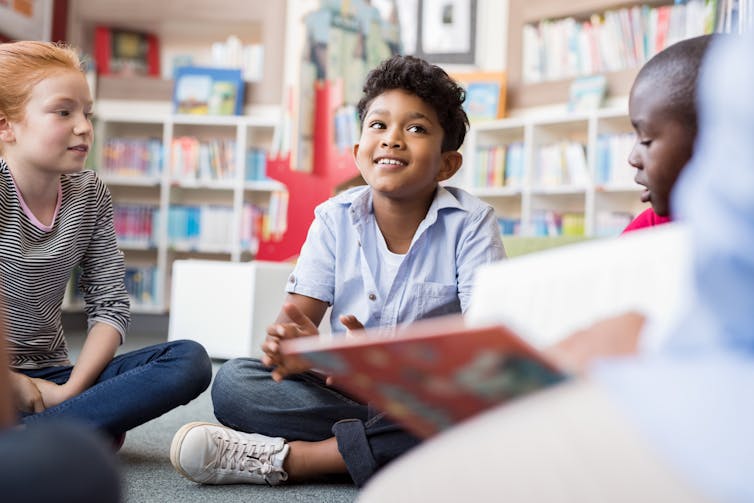Children's books must be diverse, or kids will grow up believing white is superior
- Written by Helen Joanne Adam, Senior Lecturer in Literacy Education and Children's Literature: Course Coordinator Master of Teaching (Primary), Edith Cowan University
Global support for the Black Lives Matter movement isn’t only about standing up against the injustice done to George Floyd, or Indigenous Australians in custody. People are also standing up against the entrenched racism that leads to a careless approach towards the lives of people who aren’t white.
Research shows 75% of Australians hold an implicit bias against Indigenous Australians, seeing them negatively, even if this is unconscious. Children absorb this bias, which becomes entrenched due to messages in the media and in books, and continues to play out at school and the broader community.
Making sure children have access to books showing diversity is one step in breaking the cycle that leads to entrenched racism.
Children develop bias from an early age
Children develop their sense of identity and perceptions of others from a very early age – as early as three months old. Because of this, young children are particularly vulnerable to the messages they see and hear in the media and in books.
Research over many years has shown books can empower, include and validate the way children see themselves. But books can also exclude, stereotype and oppress children’s identities. Minority groups are particularly at risk of misrepresentation and stereotyping in books.
First Nations groups are commonly absent from children’s books. Excluding the viewpoints, histories and suffering of First Nations Peoples can misrepresent history, and teach kids a white-washed version of the past.
Read more: Captain Cook 'discovered' Australia, and other myths from old school text books
A world of children’s books dominated by white authors, white images and white male heroes, creates a sense of white superiority. This is harmful to the worldviews and identities of all children.
Sharing stories through books
Evidence shows sharing Aboriginal and Torres Strait Islander stories helps break down stereotypes and prejudice. And this, importantly, helps empower Aboriginal children and improve their educational engagement and outcomes.
But research suggests many classrooms have books that are monocultural literature, and Aboriginal and Torres Strait Islander books are notably absent.
There are some encouraging signs, with an increase in the publication of books by and about Aboriginal and Torres Strait Islander peoples. We are also seeing bookshops and publishers reporting a rise in demand for books on race and racism.
 Books can empower and validate children’s identities. But they can also make them feel inferior.
Shutterstock
Books can empower and validate children’s identities. But they can also make them feel inferior.
Shutterstock
This can also help adults become informed about Australia’s colonial history. Reading these books can help challenge their own unconscious biases and misunderstandings.
Read more: Bias starts early – most books in childcare centres have white, middle-class heroes
The challenge for teachers and parents is to access suitable children’s books and share them with the children in their care. We can use these stories as a foundation for conversations about culture and community.
This can help to drive change and support reconciliation.
Other ways of sharing diverse stories
Creating Books in Communities is a pilot project run by the State Library of Western Australia that helps create books with families about their everyday experiences. These books represent the families’ culture and language.
Projects like these are another way we can recognise and extend the voices of Aboriginal and Torres Strait Islander peoples.
Another project, On Country Learning, involves children and teachers learning through culture alongside Aboriginal elders. A preliminary review of the program shows it enriches teacher knowledge and motivates all children to learn.
Reading and listening to the stories of Aboriginal and Torres Strait Islander peoples can help teachers gain important knowledge and understanding. This helps them effectively engage with and teach Aboriginal and Torres Strait Islander students.
Read more: 9 tips teachers can use when talking about racism
And it helps them teach all students about Aboriginal and Torres Strait Islander languages, histories and cultures.
To see real and lasting change children need everyday story books with heroes and characters that reflect their diverse backgrounds. To help this happen we can support groups such as the We Need Diverse Books Movement and LoveOZYA , which actively call for and promote diverse books for young people.
Affirmation of all children’s culture, language and identity at this pivotal time in world history is critical to the future of all our children.
Parents and teachers can source Aboriginal literature from websites such as: Magabala Books, IAD Press, Aboriginal Studies Press, Fremantle Press, UWA Publishing, BlackWords, Batchelor Institute Press.
Authors: Helen Joanne Adam, Senior Lecturer in Literacy Education and Children's Literature: Course Coordinator Master of Teaching (Primary), Edith Cowan University





